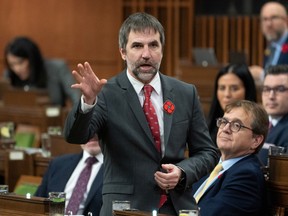The federal government projects internally that demand for electricity could double by 2050

Article content
OTTAWA — The AI-driven data centre boom was a factor in the Liberal government’s decision to scrap its target of a net-zero electricity grid by 2035, a senior government official said.
“We ran a few different forecasts of how much electricity these centres will use,” said the official, speaking on background because they were not authorized to speak publicly. “Any way you slice it, it’s a substantial amount.”
Advertisement 2
Article content
The official said the federal government projects internally that demand for electricity could double by 2050, driven by the proliferation of electricity-gobbling data centres, the shift to electric vehicles, hotter summers and population growth.
Data centres, cryptocurrency and artificial intelligence ate up two per cent of the world’s electricity in 2022, according to the International Energy Agency, and this footprint is expected to double by 2026.
Canada, already one of the world’s top five destinations for data centres, has several geographical advantages that position it to be a major player in the space, notably a cool climate suited to heat-sensitive data servers, plenty of unused land and plentiful cheap electricity.
Former Bank of Canada governor and rumoured Liberal Party leadership contender Mark Carney said last month that Canada’s booming data centres could be a key source of leverage in bilateral relations with an increasingly hostile United States.
“We are the best solution to a huge constraint (the U.S. is) about to hit on AI and data centres,” Carney said at an Ottawa event hosted by faith-based think tank Cardus.
Article content
Advertisement 3
Article content
“They’re running out of the space and certainly the clean energy for that,” said Carney.
Alberta announced earlier this month that it was hoping to leverage its abundant reserves of natural gas and geothermal energy to attract $100 billion in investments relating to data centres and artificial intelligence.
This includes a proposed $70-billion data park in northwestern Alberta backed by Dragons’ Den star Kevin O’Leary.
Federal Environment Minister Steven Guilbeault quietly admitted Tuesday that the Liberals’ 2021 campaign promise to decarbonize the grid by 2035 was unrealistic.
“Some of things that we put on the table were too stringent and from a technical point of view would be very hard to achieve without Canadians incurring a very high cost,” Guilbeault told the CBC in an interview.
The final draft of the federal clean electricity regulations, tabled on Wednesday, push the net-zero timeline back to 2050, loosening threatened restrictions on oilsands operators and natural gas plants.
The final regulations push back the grace period on gas-fired power plants by three years, allowing plants built as late as 2028 to be exempt from the rules for 25 years, up from 20 years in an earlier draft.
Advertisement 4
Article content
Domestic electricity use saw a 3.3-per cent year over year jump in mid-2024, according to Statistics Canada, continuing an upward trend since 2022.
National Post
rmohamed@postmedia.com
Recommended from Editorial
Get more deep-dive National Post political coverage and analysis in your inbox with the Political Hack newsletter, where Ottawa bureau chief Stuart Thomson and political analyst Tasha Kheiriddin get at what’s really going on behind the scenes on Parliament Hill every Wednesday and Friday, exclusively for subscribers. Sign up here.
Our website is the place for the latest breaking news, exclusive scoops, longreads and provocative commentary. Please bookmark nationalpost.com and sign up for our daily newsletter, Posted, here.
Article content







